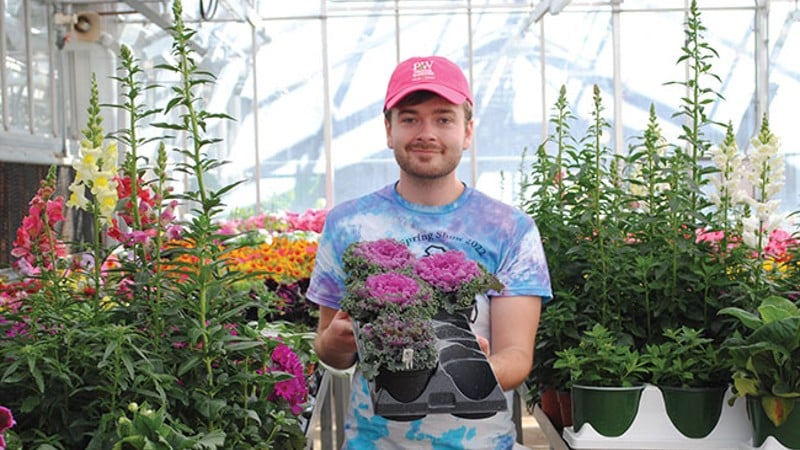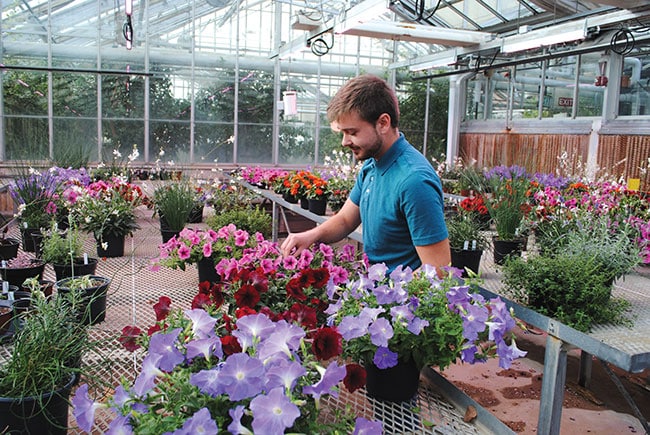
Learning the Ways of Greenhouse Growing
Internships are meant to provide learning opportunities outside of the academic setting. They are a great way for college students to experience various work environments and gain skills that only come with hands-on participation.
They also provide a chance to network with professionals of varying experiences and skill levels, as building relationships now can have an impact on impending career prospects. Discussing job opportunities with the company and learning about other companies within the industry provide important insight for deciding on future positions and companies to apply to after graduation.
 Seth Benjamin, a senior at Michigan State University (MSU), completed a summer internship with Neal Mast Greenhouses in their Mast Young Plants division located in Grand Rapids, Michigan. Mast Young Plants supplies finished bedding plants to big box stores and grow liners that are shipped around the country.
Seth Benjamin, a senior at Michigan State University (MSU), completed a summer internship with Neal Mast Greenhouses in their Mast Young Plants division located in Grand Rapids, Michigan. Mast Young Plants supplies finished bedding plants to big box stores and grow liners that are shipped around the country.
“As it was my first experience working in a wholesale greenhouse, I was trained to become a section grower for them,” Seth says. “At first, I worked alongside each of the growers learning how they conduct their daily tasks, but about a month into the internship, I was given my own production areas to manage.”
Seth’s initiative and experiences at Mast Young Plants have led to him being named the 2023 GPN/Prospiant Intern of the Year.
FROM FIELDS TO GREENHOUSES
Seth grew up on a crop farm in Michigan, growing corn, wheat and soybeans. He wasn’t sure that was the path he wanted to take as an adult, so he tried different things during his youth. He began growing pumpkins every fall to sell on the farm, and that’s when he realized there was a potential opportunity to sell other products besides field crops. His interest in horticulture grew and he expanded his knowledge with hardscapes and landscapes in his parents’ backyard. Seth and his mother created garden beds for a few years, and he learned about many different types of plants, which piqued his interest in the industry even more.
“One spring, we went to a plant sale at Michigan State University to buy plants to stock up some of our garden beds,” Seth says. “That was when I first realized that there was an entire university program dedicated to horticulture.
“Then, after that point, I strived to get into that degree,” he says. Seth began working his way into the industry during his senior year of high school, through his first internship at Christians Greenhouse in Williamston, Michigan. He was hired as an employee upon completing the internship and continues to work there today. In 2020, Seth was accepted into the horticulture program at MSU.
As a senior, Seth is an active member of the Student Horticulture Association (SHA). He has been elected to the officer position of grower, in which he will manage plant production for the annual club sale, among other responsibilities.
Seth chose the horticulture program because he wanted to learn about everything that goes into growing operations like general plant knowledge, production needs, scheduling and pest management.
THE INTERNSHIP
While attending the Great Lakes EXPO in 2021, Seth visited the Neil Mast Greenhouses’ booth and learned of the internship opportunity. A few interviews later, he was granted the internship.
Seth says he looked forward to experiencing something different. “I had worked at a retail greenhouse for four years when I first got into the [Mast Young Plants] internship, and I wanted to see what the difference between retail and wholesale greenhouses was, how they operated,” he says.
One of the major differences between a retail and a wholesale greenhouse that he noticed was the kind of plant material being grown. In wholesale, it was often one type of plant or a few different varieties growing in liners being sold to other companies or greenhouses across the country. They also produced finished plants that were sold to big box stores like Walmart, Menards and Aldi.
This was much different than his experience on the retail side, where they managed many types of plants in a smaller operation. “There was definitely a large learning curve on the retail side because you had to know all requirements of all the different plants, which made it kind of hard; you only had limited resources of what you could do differently to each plant, since it was a smaller operation,” Seth says. “But with wholesale, it was a little bit easier, I thought, on figuring out the needs for the different plants because there was less variation and it was more in mass.”
Once Seth started his internship, he had a desire to learn as much as he could about greenhouse irrigation systems. “[Mast Young Plants] has a wide variety of different types of irrigation, and so I made it a goal of mine to learn how to use all of them or at least have a general knowledge of how to use them.” He learned to use the irrigation booms and drip tape system, and spent time cleaning out the flood tanks. “I worked a tiny bit with flood floors, but by the time I got there they had mostly shut down [for the season],” says Seth. “So I didn’t really get to use that as much as I wanted to.”
WITH NEW CHALLENGES COME REWARDS
Seth gained a lot of new skills and knowledge of running a wholesale greenhouse during this recent internship. His biggest challenge was trying to become familiar with the greenhouse environment as a whole and how the operation ran. His most practical experience was learning about pesticide and PGR applications and safety protocols within the greenhouse. “I think that is going to be pretty pertinent to whatever I end up doing later on,” he says.
Seth also learned he is a better problem solver than he expected. “Quite often, I had to troubleshoot irrigation issues with filters being clogged or wires somehow being cut, and trying to figure out how to fix the irrigation outside on the drip tape so that it would run properly.”
One of the major rewards he found was watching the plants he grew during his time there being shipped out, showing that his efforts were successful. “I actually grew those plants and now someone’s going to buy them,” Seth says. “And some of the mums that I grew actually ended up at an Aldi location near one of my Facebook friends,” he says. “Those are the exact ones I grew, so I got to know where at least some of them ended up, too. I thought that was really cool to see happen.”
VALUABLE EXPERIENCES
Seth says he understands the value of participating in an internship and has gained so much from his internships this far. There are many positions within horticulture, and interning in multiple positions can pave the way to a position that is the best fit for him.
After he graduates this May, he is considering other internships and gaining more experience in other areas of horticulture.
“I’m looking at potentially doing an internship at a hydroponics place here in Michigan because right now I’m in a hydroponics class at MSU, and I find that also to be quite interesting,” says Seth. “But, at the same time, I think I would like to get a permanent position somewhere, so it’s kind of still up in the air right now.” He also plans to visit some horticulture-related expos in the coming months to browse and see what’s available.
For an enhanced reading experience, view this article in our digital edition by clicking here.


 Video Library
Video Library 




















